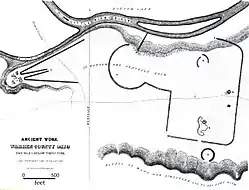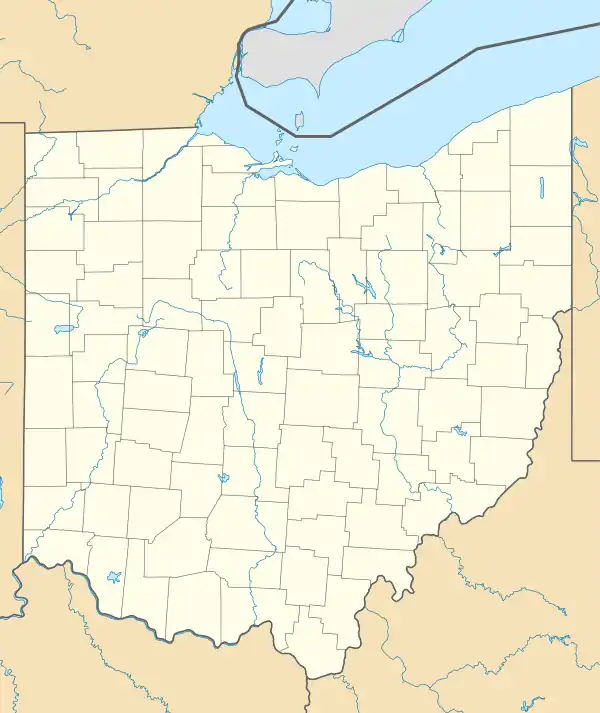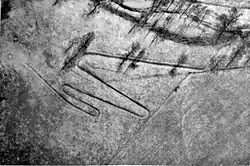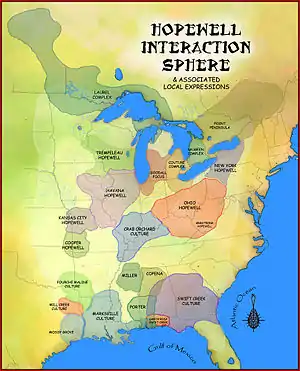Stubbs Earthworks
The Stubbs Earthworks (33 WA 1) (also known as Bigfoot Earthworks[2] and Warren County Serpent Mound) was a massive Ohio Hopewell culture (100 BCE to 500 CE) archaeological site located in Morrow in Warren County, Ohio. [3]
 | |
 Location within Ohio today | |
| Alternative name | Bigfoot Earthworks, Warren County Serpent Mound |
|---|---|
| Location | Morrow, Ohio, |
| Region | Warren County, Ohio |
| Coordinates | 39°21′24″N 84°9′36″W |
| History | |
| Founded | 100 BCE |
| Abandoned | 500 CE |
| Cultures | Ohio Hopewell culture |
| Site notes | |
| Archaeologists | Frank Cowan |
| Architecture | |
| Architectural styles | earthworks, timber circle |
| Architectural details | |
Stubbs Earthworks | |
| NRHP reference No. | 78002205[1] |
| Added to NRHP | April 4, 1978[1] |
| Responsible body: private | |
Site description

The site was a ceremonial center consisting of an earthen enclosure with circular and rectangular elements and a separate smaller circular enclosure that contained the remains of a timber circle. To the east of the main enclosure on a high terrace overlooking the site was a large W-shaped earthwork. This was once thought to be a snake effigy mound similar to the Great Serpent Mound in Adams County, Ohio; although archaeologists do not currently think this was the case.[3]
Timber circle
In September 2005 archaeologist Frank Cowan conducted excavations at the smaller circular enclosure; discovering a timber circle 240 feet (73 m) in diameter and composed of 172 large posts. Carbon dating of charcoal found in post molds at the site have dated the structure to 200-300 CE.[4]
Modern history
Although ignored by Edwin Hamilton Davis and E. G. Squier for inclusion in their seminal archaeological and anthrolopological work Ancient Monuments of the Mississippi Valley in 1847; the site was visited and mapped by Charles Whittlesey in 1851.[5] Since that time much of the site has been destroyed by farming, gravel quarrying, and encroaching development. The Little Miami High School was constructed over part of the earthworks in 2000; although some of the site is still preserved on its grounds.[3] It was listed on the National Register of Historic Places in 1978.[1]
See also
References
- "National Register of Historic Places-Ohio". National Register of Historic Places. National Park Service. 2009-06-02.
- Woodward, Susan L.; McDonald, Jerry N. (1986). Indian Mounds of the Middle Ohio Valley: A Guide to Mounds and Earthworks of the Adena, Hopewell, Cole, and Fort Ancient People. Blacksburg, VA: McDonald & Woodward Publishing. p. 246–249. ISBN 978-0939923724.
- "Stubbs Earthworks". Ohio History Central. Retrieved 2017-12-20.
- Cowan, Frank (2005). "Stubbs Earthworks : An Ohio Hopewell "Woodhenge"". In Lepper, Bradley T. (ed.). Ohio Archaeology : An illustrated chronicle of Ohio's Ancient American Indian Cultures. Wilmington, Ohio: Orange Frazer Press. p. 148–151. ISBN 978-1882203390.
- Lynott, Mark (2015). Hopewell Ceremonial Landscapes of Ohio: More Than Mounds and Geometric Earthworks. Oxbow Books. ISBN 9781782977551.
External links
| Wikimedia Commons has media related to Stubbs Earthworks. |

